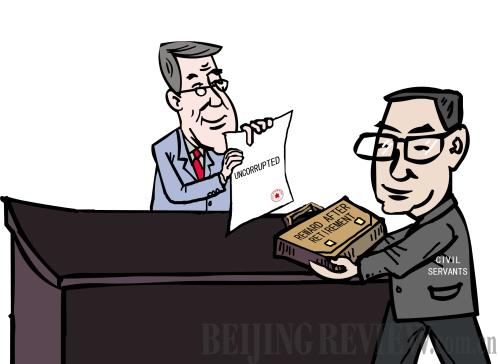|
 |
|
(LI SHIGONG) |
The Chinese Central Government has taken stricter measures to fight against corruption in recent years, especially the past year. A plan was recently submitted by the Development Research Center of the State Council that civil servants will be rewarded financially after retirement if they resist corruption and remain honest during their service. The proposal has triggered discussions among people. Supporters believe that a clean reward system would encourage a cleaner government. Successful examples of this can be found in both Singapore and Hong Kong. However, opponents of such a plan are worried that it would gradually turn into a new form of welfare for civil servants. Could this work in China? The following are excerpts of opinions:
Zhou Chengming (Dongnan Morning News): A clean performance reward system might be a useful supplement to current anti-corruption methods in China. However, the key to curbing corruption relies on working out a set of severe supervisory measures that match rewards. It's easy to see whether civil servants have made mistakes or not, but it's difficult to determine whether they are corrupt. How is "clean performance" defined? There must be a rigid assessment standard to ensure the transparency and fairness of reward system, so that it could really help curb corruption.
Wuyetingcan (wenming.cn): It is widely believed that clean governance is a basic requirement for civil servants. The root of corruption lies in the unrestrained power at the hands of civil servants. As long as they are free to use their power as they like, so-called clean rewards would do little to help curb the spread of corruption.
The clean performance reward system has been operating in Singapore and Hong Kong for many years, encouraging civil servants to refrain from corrupt actions. But it is a fresh attempt in China. The government should listen to public opinion. Clean rewards should be kept from becoming just another form of welfare.
Many factors have led to corruption among civil servants. In response, authorities need to weave a rigid anti-corruption network. Clean rewards are just one of many tools to fight corruption. Whether this would work or not remains to be seen.
Wang Xiao (Dongnan Morning News): Chinese civil servant salaries are not as high as most people think. In some cases, government employees struggle to get by on their monthly incomes. Besides, the incentive system for civil servants is quite simple here in China and relies mainly on promotion. A clean reward could thus serve as an incentive for civil servants not to partake in corrupt practice.
Although a clean reward is important in fighting corruption, it only plays a supplementary role. Still, more education among civil servants is necessary, while punishment for corruption should be reinforced. We hope to see a situation where civil servants are afraid and unwilling to be corrupted.
Chen Yiwen (Dongnan Morning News): I think the direction of reform is right. When civil servant retirement rewards are connected to daily performance, this kind of reward system would act as an incentive to encourage clean behavior.
The important thing is to define what clean performance entails, alongside a reasonable amount of money in reward. It's necessary to demand that civil servants declare their personal assets.
Huang Fucheng (Dongnan Morning News): Some would like to think that civil servants act clean in the first place as a basic requirement of their position. However, the average salary of a civil servant in China is not very high, which means that most struggle to deal with high house prices and inflation. A clean performance reward could boost the image of retirement and prevent risks associated with temporary interests, which pertains to preventing corruption.
| 